Different Treatment of Rohingya Refugees in Thailand, Malaysia and Indonesia
Rohingya refugees in Thailand, Malaysia, and the Philippines are treated differently than those in Indonesia.
maaf email atau password anda salah
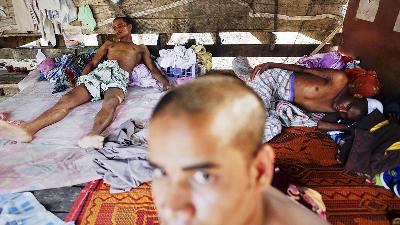
Rohingya refugees in Thailand, Malaysia, and the Philippines are treated differently than those in Indonesia.
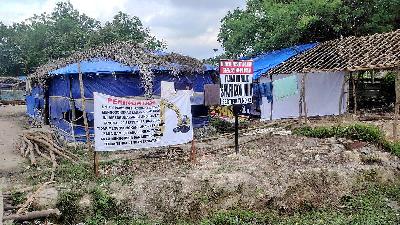
The Rohingya refugees living in Pekanbaru have more freedom to move around and reside in lodgings. Their children can also attend school.

The increasingly overcrowded refugee camps demand improvements in the mechanisms for handling Rohingya refugees. The number of refugees continues to rise.

Several Rohingya refugees successfully built their careers in various fields. They continued to work and raised awareness about the plight of displaced Rohingya refugees.
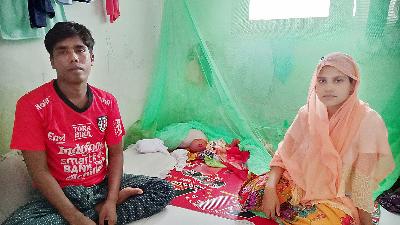
Rohingya refugees are still living in several inadequate temporary shelters in Aceh.

There are indications of problems with the IPO of Barito Renewables Energy. The stock exchange and capital markets authorities are neglecting their responsibilities.

There is an increasingly real threat to Indonesia’s biodiversity. It cannot be overcome through empty slogans at international forums.

The KPK should designate Sahbirin Noor a fugitive. There is a good chance the South Kalimantan Governor will go free.
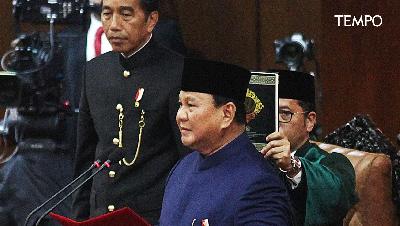
How did Prabowo Subianto decide on the composition of his cabinet? There are indications that several prospective ministers were proposed by tycoons.

Prabowo Subianto is inheriting an inefficient economy. Yet his new administration is likely to follow Jokowi’s economic model.
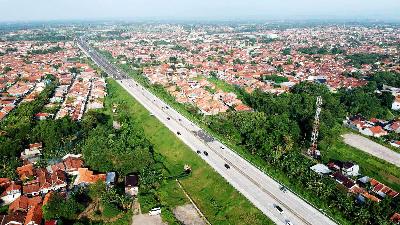
The Joko Widodo administration leaves a heavy burden for state-owned enterprises. Many projects result in big debts.

President Jokowi entrusted his confidants to join Prabowo’s cabinet. Several ‘volunteers’ also received positions.

Prabowo Subianto formed a large cabinet to accommodate the interests of parties, businessmen, and his supporters. Mining entrepreneur Haji Isam is suspected of proposing several ministerial candidates.

KPU Chair Mochammad Afifuddin on turbulence within his institution following the dismissal of Hasyim Asy’ari, and the Constitutional Court’s decision on the regional head elections.
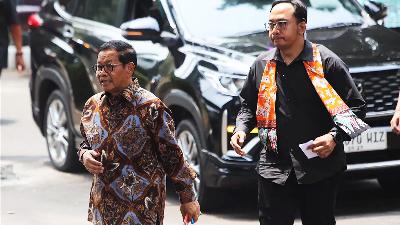
Megawati reportedly did not approve of PDI-P cadres entering Prabowo’s cabinet. She chose Pramono Anung to communicate with Prabowo.

The Stock Exchange detects alleged violations in the IPO of Barito Renewables Energy. There are indications of maneuvering around public shareholding requirements.

Cartoon: Yuyun Nurrachman
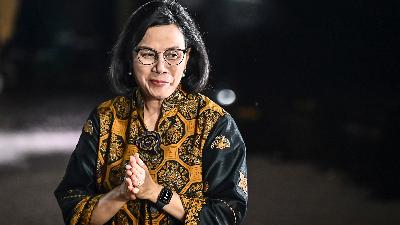
Sri Mulyani and several economic ministers from Jokowi join Prabowo’s cabinet, with encouragement from two former presidents.

Indonesia’s delegation at COP16 CBD in Cali, Colombia, is not led by a minister. Biodiversity funding is at risk of not being agreed upon.

South Kalimantan Governor Sahbirin Noor is suspected of receiving commissions on three projects in the e-catalog. He has not been seen since being named a suspect.
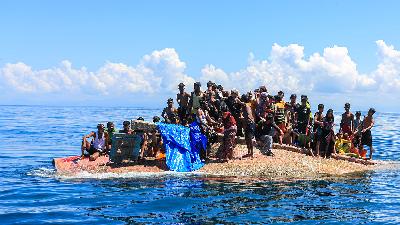
Uncertain future looms over Rohingya refugees in Indonesia. They are also struggling with various limitations.

Empathy is the key to happiness. We are happy when we help others, we are happy when we do good.

OJK’s right of reply and a remembrance to Mochtar Lubis who wrote about government.

The KPK uncovered alleged embezzlement of the Taspen pension fund involving Sinarmas Sekuritas. The result of poor supervision by the OJK.

A number of policies from Minister Sakti Wahyu Trenggono are riddled with conflicts of interest. They benefit his son, Indra Trenggono.

There are indications that the selection of the KPK leadership for the 2024 to 2029 period is in breach of a Constitutional Court ruling. The process needs to be rerun.

Jokowi is like a king reluctant to relinquish his crown. Nearing retirement, he is still trying to improve his image.

A reader’s letter suggests authorities seek ways for safe and efficient logistics transportation, in order to minimize traffic accidents.

Farwiza Farhan, the winner of the 2024 Ramon Magsaysay award talks about conservation of the Leuser Ecosystem in Aceh.

The KPK Leadership and Supervisory Board Selection Committee claimed to have followed procedures, and Jokowi reportedly did not intervene.
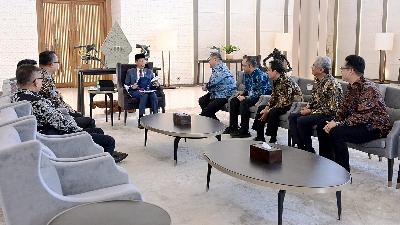
Various parties from the National Police Chief to the State Palace are accused of interfering in the KPK leadership candidates selection process. The candidates are divided into four clusters.

The KPK is investigating Taspen’s investment losses. Sinarmas is behind the transaction.

The family members of some ministers enter the fishery business. Other problems, such as the activity of illegal foreign vessels and the abuse of crew members, still prevail.

Explanations from State Secretary Minister Pratikno and Maritime Affairs and Fisheries Ministry on fishery business and the case of illegal ships in eastern Indonesia.
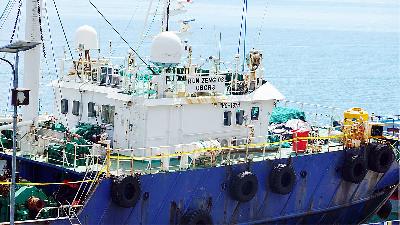
Illegal fishing and slavery continue to occur in Indonesian waters. Crew members are vulnerable to abuse.

Minister Sakti Wahyu Trenggono revives a shutdown port. There is indication that the minister’s son is involved in the fisheries business.

Tempo’s interview with Minister of Communication and Informatics Budi Arie Setiadi about Jokowi’s campaign before the end of his tenure.
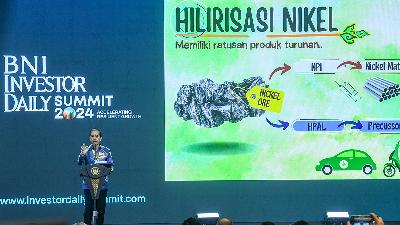
Jokowi’s campaign promoting his successes is considered as not portraying actual conditions. Customary communities are among the victims of his administration.

After stepping down, Jokowi will return to Solo, accompanied by his loyal supporters. He is not having a lavish farewell in order to avoid any negative sentiment.

As President Jokowi's term neared its end, instructions were given to promote the government's achievements, and billions of rupiah in contracts were offered to the media.

The market showed no positive reaction ahead of Prabowo Subianto's government, which was held back by the high amount of debt.

Life is not always about science and philosophy. This is where literature shows its value.

Cartoon: Yuyun Nurrachman

Jakarta's regulations were considered as failing to fulfill the aspirations of differently-abled people
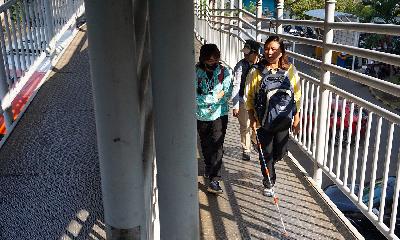
Tempo accompanied several differently-abled people as they navigated public transportation in Jakarta.
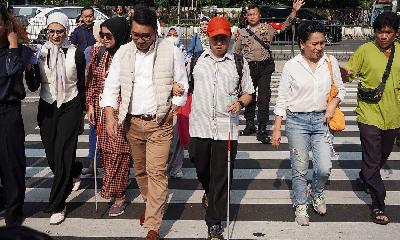
Jakarta governor and deputy governor candidates promise improvements in inclusive public transportation.

Jakarta is striving to provide inclusive transportation, but challenges remain, from funding issues to construction oversight.

Despite some improvements, much still needs to be done regarding access to public transport for people with disabilities.

Officials are all trying to avoid responsibility for illegal gold mining in protected forests. The dangers to the environment and to health are being ignored.

Instead of paying its debts, the Bakrie Group is suing 12 creditors. This could become a bad precedent for the investment climate.

The contest for the selection of the Supreme Court Chief Justice is heating up. There are indications it is riddled with the interests of the government and tycoons.
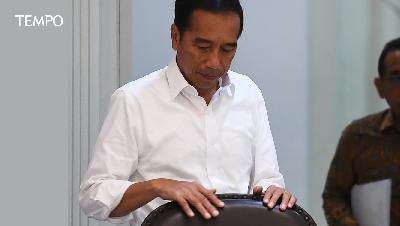
Jokowi passed a number of strategic policies at the end of his administration. Making the president-elect a hostage to fortune.

Illegal gold mines that collapsed in Solok Regency, West Sumatra, damage the Batanghari watershed. Authorities are suspected of protecting investors.
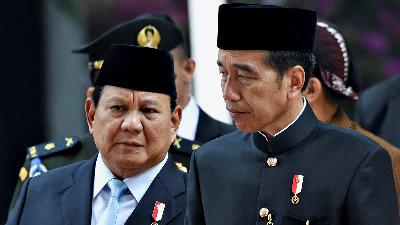
Before Jokowi’s term ends, the Presidential Palace is maneuvering to provide cover for Gibran. This includes erasing traces of the Fufufafa account as well as interfering in the formation of Prabowo’s cabinet.

Luhut explains his close ties with Jokowi, and the plans of the president-elect Prabowo. This is his first interview with Tempo after the one on the Panama Papers eight years ago.
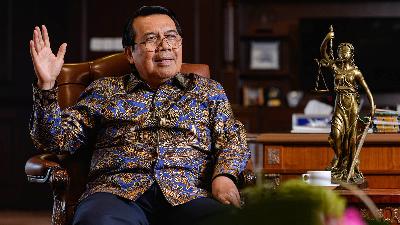
Supreme Court Chief Justice Muhammad Syarifuddin uses artificial intelligence to handle cases. Case brokers continue to be a threat.
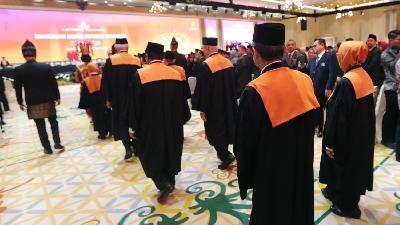
The race for the position of Chief Justice of the Supreme Court is heating up amid a flurry of allegations against certain candidates. There is suspicion of backing from business circles.

Indonesia and other countries continue to oppose the European Union’s Deforestation Regulation. The European Commission proposes a delay.

VIVA Group is facing a restructuring process under a debt payment suspension scheme and is threatened with bankruptcy. There are maneuvers to lobby creditors and reduce debt.

Media companies are experiencing upheaval due to the rapid changes in the business landscape. The industry is moving towards a new equilibrium.
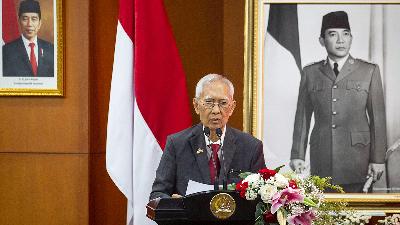
President Joko Widodo is suspected of supporting the restoration of Suharto’s name, with a possibility of being declared a national hero.
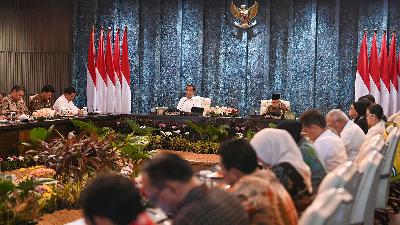
Jokowi is preparing for the incoming Prabowo-Gibran administration starting in late February 2024. He hopes that Prabowo can continue his programs.

Indonesia’s economy and financial markets are once again facing volatility stemming from China and the Middle East, leaving no respite for investors.

Power is never without crisis. Tumapel shows power as a story of unending antagonism.

With old faces still occupying more than half the seats, can DPR members be trusted to speak up and truly represent the people’s voice?
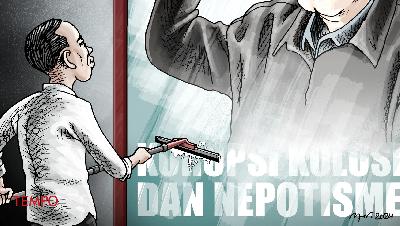
Cartoon: Yuyun Nurrachman

The police arrested a drug baron who was operating from inside a prison. It is a chronic problem that remains unsolved.

Using a variety of pretexts, the political parties replace elected legislative candidates. This is a betrayal of the people’s choice.

The kidnapping of pilot Phillip Mehrtens was ended through negotiation. This is a lesson for the Prabowo administration about how to resolve the Papua conflict.

The sea sand export policy benefits financial backers close to tycoons. Also, it is a gift for Singapore.
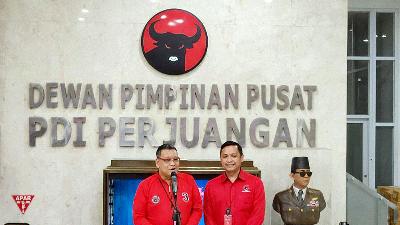
Political parties replace elected legislative members over alleged vote manipulation.
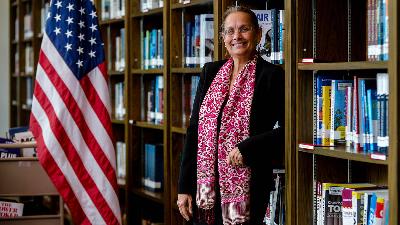
United States Ambassador Kamala Shirin Lakhdhir speaks about women, education, and Indonesia’s new administration.

The partnership between Riau regional company and Kingswood Capital Ltd resulted in criminal charges, with two top executives now facing allegations of embezzlement.

Hendra Sabarudin’s drug network distributed methamphetamine from Tarakan prison starting in 2017, allegedly aided by police and prison guards.
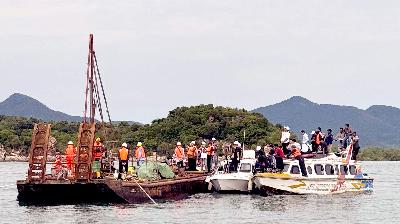
Customs has differing views from the Ministry of Maritime Affairs and Fisheries regarding sea sand export tariffs, aiming for regulations that facilitate ease.

Egianus Kogeya quietly freed Susi Air pilot Phillip Mark Mehrtens. His hope to trade the pilot for Papua’s independence failed.
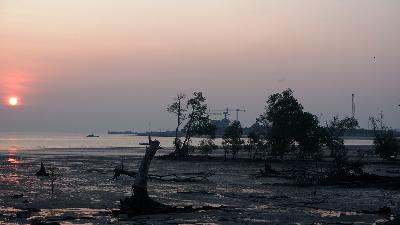
The government plans to dredge 17.6 billion cubic meters of sea sand and sediment, altering the landscape and destroying marine life.

Two ministers of President Joko Widodo have paved the way for the exploitation and export of sea sand. Domestic and export interests are at odds.

Trade Minister Zulkifli Hasan on the issues ranging from sea sand export policy to Prabowo Subianto’s bureaucratic management style.
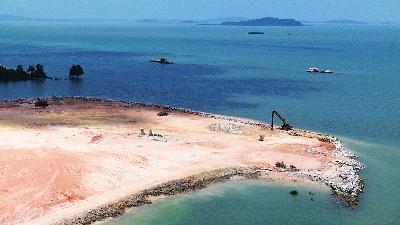
The government designated a number of areas as zones for cleaning sediment and sea sand.
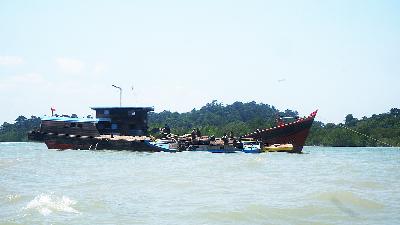
The demand for sea sand continues to increase, driven by the growth of infrastructure, construction, and the glass and solar panel industries.
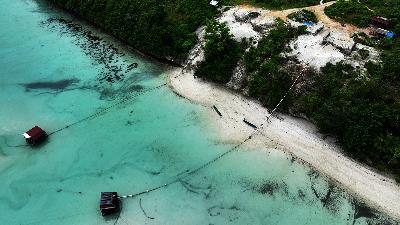
The plan to export sea sand faces obstacles from the Ministry of Energy and Mineral Resources. Oppositions also come from the DPR.
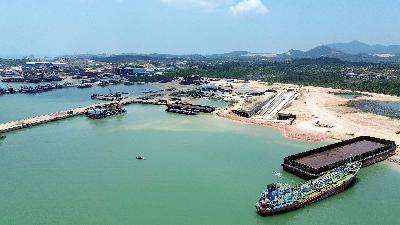
Dozens of companies are seeking permits to process marine sediment. They include businessmen, regional head candidates, and former cabinet ministers.

Indonesia is poised to fall into the middle-income trap. Only a few people enjoy the economy pie.

News that there would be a mass rally to show support for Jokowi did not materialize. Had it been, then what for?

In many nations, history seems to be covered up so that its narrative never progresses.

Cartoon: Yuyun Nurrachman

The hand of the government is apparent in Kadin’s internal conflict between Arsjad Rasjid and Anindya Bakrie. This has no effect on the public.

KPK officials are inconsistent in their explanations of the Bank BJB corruption case. There are indications of collusion with the government.

Prabowo Subianto is to form a cabinet comprising numerous ministers. This is made possible through a revision of the law.

The food estate projects in Merauke are at risk of failure. There are suspicions about the way the projects are shared out.
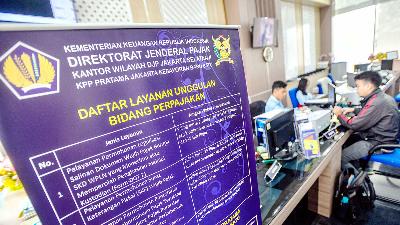
The leakage of six million Taxpayer Identification Numbers (NPWP).

The KPK named five suspects in the Bank BJB advertising budget corruption, but it has yet to implicate high-ranking officials in the West Java Provincial Administration.

President-elect Prabowo’s cabinet is predicted to be filled by more than 40 ministries in an effort to accommodate the interest of the parties supporting him.
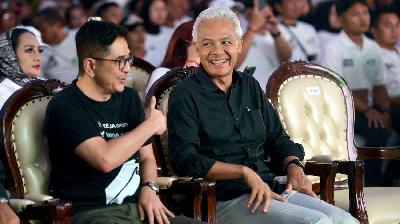
Arsjad Rasyid and Anindya Bakrie both claim support from regional Kadin branches. Legal battles continue.

Anindya Bakrie ousts Arsjad Rasjid from the position of General Chair of the Indonesian Chamber of Commerce and Industry (Kadin). The Palace’s support shifted.

Cartoon: Yuyun Nurrachman
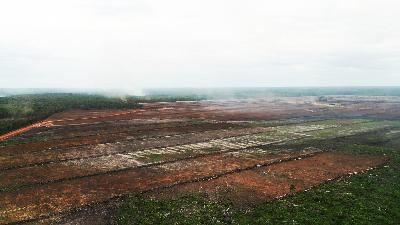
The food estate project in Merauke has the potential to repeat the failures of MIFEE in the past. Developing large-scale agriculture is challenging.

The clearing of forests for the food estate project does not yet have an environmental impact assessment. It will be issued later.
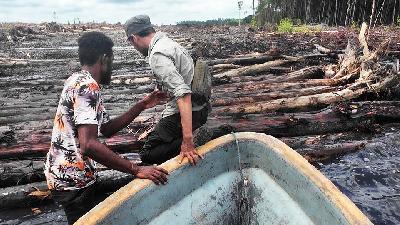
Two food estate projects are simultaneously being launched, targeting 2.29 million hectares of forest and land in Merauke. There are intrigues involving Prabowo and Jokowi. This report is part of a collaborative coverage and research initiative by Tempo, the Pusaka Bentala Rakyat Foundation, and Trend Asia.
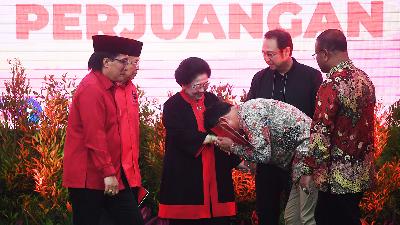
The PDI-P will be nominating Anies Baswedan in the Jakarta gubernatorial election. A popular candidate against Jokowi’s coalition.

The opportunity for Anies Baswedan to contest the Jakarta gubernatorial election is slipping away after the coalition of parties supporting him fell apart. There is a guerrilla from the Palace.

An exclusive Tempo interview with Anies Baswedan regarding his chances to run in the Jakarta regional head election.

Jokowi and Prabowo’s coalition are maneuvering to thwart Anies Baswedan’s candidacy in the Jakarta regional head election. Cabinet posts are being offered as inducements.

Chances for Anies Baswedan to run in the Jakarta regional head election are beginning to open up. A number of political parties support Prabowo Subianto intend to nominate Anies.

Thirteen-year-old Afif Maulana was found dead under a bridge in Padang, West Sumatra. He had allegedly been tortured by the police.

The number of Indonesian umrah minor pilgrimage travelers grows during the fasting month of Ramadan. The nation’s umrah economic potential has not been fully harnessed.

A defendant of the Supreme Court justice bribery case is allegedly subjected to extortion by someone claiming to represent the leadership of the KPK. The name Firli Bahuri is also implicated.
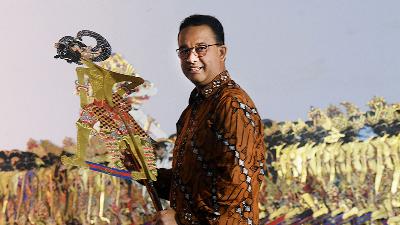
Anies Baswedan talks about the campaign. He admits there are talks with the Ganjar-Mahfud team.

The claim that the Gunung Padang site is the oldest pyramid in the world is strongly challenged. A collaboration of researchers from around the world is needed.
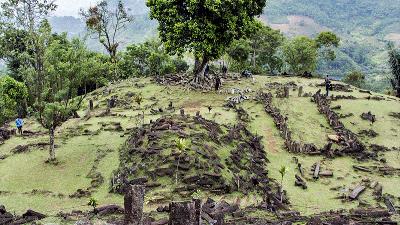
Foreign archeologists doubt the site of Gunung Padang as the world’s oldest pyramid. A journal publisher is going to investigate.

Moh. Wijdan, Head of Ketapang Jaya village, Ketapang, Sampang, East Java, replies to Pressure from the Police and Prosecutors article.

Anies Baswedan is campaigning aggressively through TikTok. It is forbidden to talk about politics and campaigns.

Several high-ranking veterans formerly supporters of Jokowi and Prabowo switched their allegiance to Anies Baswedan. Several officers held disappointment.

Anies Baswedan choses Muhaimin Iskandar to be his vice-presidential running mate. Agus Harimurti Yudhoyono is eliminated in the final turn.

The concept of Kampung Madani is to optimize the business and economic potential of the region. #InfoTempo

A family of Sumatran tigers died after being caught in snare traps in Aceh. With a population of about 600, this endangered wild animal is threatened by poaching, loss of habitat, and conflict with humans.

Poaching produce in the North Natuna Sea is not only triggered by economic need. According to the Director of the Fleet Monitoring and Operations of the Marine and Fisheries Resources Directorate-General in the Maritime Affairs and Fisheries Ministry, Pung Nugroho Saksono, a conflict similar to the Sipadan-Ligitan case between Malaysia and Indonesia should not be allowed to recur.

Corruption Eradication Commission (KPK) investigator, Novel Baswedan, has doubts about his alleged assailant Brig. Rahmat Kadir Mahulette’s statement, calling him a traitor.

MEDAN Mayor Tengku Dzulmi Eldin’s alleged bribery case has roped in a number of parties, from bureaucrats to businessmen.

THE ivory hornbill or rangkong is a symbol of courage and bravery for Dayak community in Kalimantan. The bird is also considered a protector, and acts as the bridge which connects the souls of their ancestors with the Dayaks. Despite this, in the past three years, the population of the ivory rangkong has depleted alarmingly. In 2015, international conservation organizations announced its status as critically endangered.
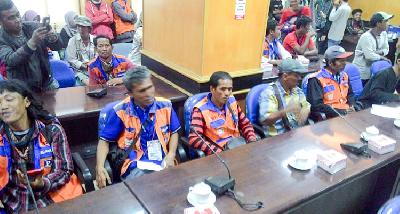
Parking attendants in Makassar were given paralegal training by the Makassar Legal Aid Institute. The program aims to improve legal awareness and embolden participants to fight corruption.

THE Civil Society Coalition has worked with Change.org to launch a petition demanding President Joko Widodo to form a joint fact-finding team (TGPF) to investigate the attack using acid against Corruption Eradication Commission (KPK) investigator Novel Baswedan.

Sartono Kartodiredjo’s dissertation Pemberontakan Petani Banten 1888 (The Peasants’ Revolt of Banten in 1888) and Catatan Harian Imam Samudra (Imam Samudra’s Diaries) were two texts that significantly influenced Jompet Kuswidananto’s work On Paradise, exhibited at the Museum of Contemporary Arts, Grand-Hornu, Belgium.

Organic coffee farming in Kiadan Plaga is the main source of income. It is also a vehicle for the village’s brand of ecotourism.~

Rizieq Syihab, charged in a pornography offense, did not show up at his scheduled questioning at the Jakarta police headquarters on April 25. He said he wanted to travel to Mecca, Saudi Arabia, to perform the lesser pilgrimage (umrah). This Grand Imam of the Islam Defenders Front (FPI) promised he would be present for questioning upon returning from the Holy Land in mid-May. However, the post-Ramadan fasting month holiday has passed and he has yet to return to Indonesia.

Anies Baswedan took advantage of the final week of the campaign to emphasize his rejection of land reclamation work on the north shore of Jakarta. On Wednesday last week, Anies, who is running for the office of the Jakarta governor, endorsed by the Gerindra Party and Justice and Prosperity Party (PKS) went to the dock in Cilincing, North Jakarta. He took part in the parade with the theme "Fishermen Reject Land Reclamation."
There were 150 ships there, each carrying 10 fishermen, which sailed in a convoy on Jakarta Bay, from Kalibaru dock to Cilincing. These fishing boats visited Island G, an island where work had once stopped, which is being worked on by the Agung Podomoro Land company. They put up a banner there which read "Reject Land Reclamation."

Friday last week was a busy day for 47-year-old Anies Baswedan, who began his day's activities from early morning. His schedule was full and it did not end until nearly midnight. "I haven't slept much," said Anies.
That day, Anies, the former education and culture minister, was selected a candidate in the Jakarta gubernatorial election, by the Gerindra Party and the Justice and Prosperity Party (PKS). His running mate is Sandiaga Uno, a Gerindra member and businessman. There was a series of events he had to attend following his nomination: the public declaration of his candidacy, registration at the Jakarta General Elections Commission (KPUD) and political meetings. At the end of that Friday, Tempo reporter Prihandoko had a chance to interview Anies about his nomination

THE four big mammals that have always been the focus of World Wildlife Fund (WWF) Indonesia, according to Arnold Sitompul, are tigers, orangutans, elephants and rhinoceroses. It is not just because they are endemic to the islands of Sumatra, Java and Kalimantan. The animals are listed by the International Union for Conservation of Nature (IUCN) as critically endangered. "These species have always been our main concern because they are endemic to Indonesia, and so they've always been our priority," Arnold told Tempo.
Out of the four endangered mammals, the most threatened are the Sumatran rhinos (Dicerorhinus sumatrensis), of which only about 300 are left in the wild. Meanwhile, the population of Sumatran elephants (Elephas maximus sumatranus) plummeted by 50 percent in less than 10 years. Arnold recently spoke to Tempo English reporter Amanda Siddharta on WWF Indonesia's efforts to conserve these iconic beasts. Excerpts:

The huge education budget20 percent of the total state budgetdemands a significant improvement in the quality of the national education system, something that Indonesians have been yearning for years. Now, it is up to Education and Culture Minister Anies Baswedan to respond to those demands.
The first step that Anies has started is publicizing all data on public education. The Education Balance Sheet publication contains information that until recently was not available to the public, such as the number of students in schools, the proportion of students to teachers, the number of damaged and broken-down schools, the quality of teachers based on teacher competence evaluations, the different education budgets between national and regional budgets, the budget allocation per student and the number of accredited schools.

This is the story of death. It is begun with somebody's death and ends with your own death. Yes, your death. No need for surprises," Faisal Oddang opens his story in his maiden novel Puya ke Puya. Death is the frame of the whole narrative, binding the subplots throughout the 218-page novel.
Yet, death here is not described in fear or anxiety. Faisal sets it with the background of the Toraja community that views death as something intimate. "Most Torajans celebrate death and keep it as close as possible in their memories," writes Faisal.

It is increasingly clear that the charges against Corruption Eradication Commission (KPK) investigator Novel Baswedan were mostly fabricated. The National Ombudsman found suspected fraud in the police investigation. The prosecution's case against Novel, concluded the Ombudsman, should not even have qualified for a court hearing.
Irregularities were first suspected when a 2004 resolved case involving Novel was regurgitated. He was, at the time, posted in a Bengkulu district police precinct and charged with allegedly allowing his subordinates to torture some bird-nest thieves. The case should have been closed after Novel was given a strong warning that same year. Unfortunately, the police dug it up when Novel, as a KPK investigator, exposed the corruption inside the National Police traffic division.

After the noon prayers, Irzal Rakhmadani, 24, packed his things in a rucksack and went out. Two items he never goes without are his stethoscope and sphygmometer. He would ride on his motorbike to the office of the World Wild Fund for Nature (WWF) in Palangkaraya, Central Kalimantan, three kilometers away. There, he would treat people suffering from the effects of forest fire smoke around Palangkaraya. In 2015, he treated some 1,000 patients.
In mid-September, Irzal and his colleagues visited a camp for workers who had been laid off by an oil palm company. Fifteen volunteers of Earth Hour Palangkaraya had gathered to help the smoke victims there. Irzal saw something that distressed him. About 300 people were crammed into a 5x15 meter barrack. Because there was not enough room, tarpaulin tents had been set up outside the barracks. People lived alongside chicken and their pet dogs.

ON the first day that Anies Baswedan began his job as minister for culture and elementary and secondary education a year ago, he knew there would be piles of work ahead of him. Among the many issues that needed to be sorted out was the scarcity of teachers in Indonesia's remote areas. Yet, statistically, there should have been enough teachers to go around. The student-teacher ratio is around 16 to 1. "That's an excess, while in South Korea, the ratio is 30 to 1. Ideally it should be 25 to 1," said Anies, admitting that the problem in Indonesia was one of unequal distribution. In some places such as Papua, the ratio dropped significantly to 75 students for every teacher. So, in May this year, the education ministry initiated the Guru Garis Depan (Frontline Teachers ) program to address the shortage of teachers in the outer parts of the country. So far, 798 teachers have been sent out to teach at 28 regencies. Next year, the number is expected to increase to 3,500. Anies discussed the Frontline Teachers initiative with Tempo English reporters Sadika Hamid, Syari Fani and Amanda Siddharta. Excerpts:

THE Energy and Mineral Resources Ministry has an ambitious plan for next year: raising the budget for the development of renewable energy by 10 times. "The future of Indonesia's development depends on seeking and building renewable energy. We can no longer rely solely on fossil fuel energy, which is bound to become scarce," said Dadan Kusdiana, director of the ministry's section on bio-energy.

A strain of wheat developed by researchers at the Andalas University School of Agriculture in Padang, West Sumatra-the Galur SO-3, or GURI 6 UNAND-has been identified as one of four superior varieties of wheat by the Cereal Plant Research Center last November.

Rice, rendang beef stew, jackfruit curry and many kinds of sambal (chili paste) sit in the front lanjar (guestroom) of Etek Nuraini's traditional rumah gadang house in Nagari Sumpur, in the Tanah Datar regency of West Sumatra. It is early in the month of February. Some 40 guests have gathered, including village elders and West Sumatra Governor Irwan Prayitno. Guests sit on the floor, eating side-by-side. Prayers are recited for the safety and wellbeing of those who will inhabit the house. Family photos hang on the wall. Windows are left open to let sunlight in.
From the vantage of the dining area, the house's spacious interior is in clear view. Six jua (Cassia siamea) pillars grace the building's 17-meter-long sides. Jua, a type of ulin ironwood, is extremely durable: once dry, its impossible to cut it down to size. The walls, meanwhile, are made of surian (Toona ciliata), and floors from bayur (pterospermum javanicum) tree trunks.

Forty young men strain and groan, taut muscles shining with sweat as they haul a jua tree (Cassia siamea) out from a ravine near Singkarak Lake, West Sumatra. The trunk is 11 meters long and will be used as the main pillar in a rumah gadang (traditional Minangkabau house). The house is being built for the heirs of Etek Siti Fatimah in the hamlet of Nagari, Sumpur village, Tanah Datar regency. Etek is what locals call an aunt, or a respected female figure.
The men take turns pulling the tree up and out of the gully. Shortly after noon, they reach the top. After clearing another small rise they toss the trunk down the other side, watching it tumble downhill.

PHOTOGRAPHS of elementary school students hang on the walls of the Ki Hajar Dewantara Building of the Elementary and Secondary Education and Culture Ministry in Jakarta. Most of them show children in remote areas, wearing shabby uniforms but genuine smiles on their faces. The photographs were put up at the request of the new minister, Anies Baswedan, who asked that they be hung everywhere, including in all meeting rooms. "So that when we meet, their faces will remind us that we work for them," said Anies, in his office last week.
Barely two months into his new assignment, Anies has created a buzz in Indonesia's education sector. He changed the function of national school examinations from determining a student's passing grade to merely a tool to measure the quality of education. A recent bombshell was when Anies halted the Curriculum 2013 and reverted to the Curriculum 2006 on December 6. He rejected the new curriculum because he noticed that teachers and schools were not ready to use it. "It's like being told to suddenly switch to an iPhone when you're used to using BlackBerry," Anies explained.

His name is Sekarpandan. He is short, with a huge behind. In Cirebon style wayang kulit, he is one of the nine clown-retainers who accompany the five Pandawa.
Sekarpandan got his bodily form after taunting Semar, who wanted to marry Sekarpandan's older sister Sudiragen. In the fight that ensued, Sekarpandan lost and was thrown into a clump of pandanus, immediately changing form: he became a replica of the person he had been taunting. Also in character.

PERHAPS he was born with a gun in his hand. At the age of 13, Benny Moerdani fought as a member of the military academy cadets. He nearly died when Dutch gunfire destroyed his rifle barrel. Fragments flew into his face, causing him to bleed profusely.
Without being trained as a paratrooper, Benny once jumped from an airplane over Pekanbaru to win back the Caltex oilfield which had been taken over by rebels from the Revolutionary Government of the Republic of Indonesia (PRRI). During a different assault in Padang, his parachute failed to open. The cord wrapped around his leg, and his body slammed against the plane's fuselage. Fortunately he was able to use his reserve chute. With his leg in a cast, he insisted on going to the battlefield.

A national research team has discovered ancient buildings and artifacts at the Mount Padang archaeological site in, Cianjur regency, West Java. The team's deputy chairman for geology, Danny Hilman Natawidjadja, said they had found a 22-centimeter-long stone rod on the mountain's southern slope, about two or three meters below the surface. The rod has pores and magnetic characteristics that attract it to metal. "It resembles Harry Potter's magic wand, which is fit for gripping," Danny said last week.
Other finds included knife-shaped metals, metal waste and burned soil with stacks of stones beneath. Based on laboratory tests, the burned residual materials have been in the location since 5,200 BC.

FOR almost a year, Hamdan Zoelva has only managed to sleep five hours a day. As the chief justice of the Constitutional Court he has had to bear the consequences of his predecessor Akil Mochtar's actions. Last year Akil was arrested, tried and sentenced to jail by the Corruption Eradication Commission (KPK). "Many people don't trust the Court anymore," said 52-year-old Hamdan.
Akil was guilty of accepting bribes from regional chief executives whose elections were in dispute. He was arrested in early October 2013, in the process of receiving money from Hambit Bintih, district chief of Gunung Emas. The case shook the Court. When Hamdan took over, public trust in the judiciary was at its lowest.

CONSTITUTIONAL Court Chief Justice Hamdan Zoelva turned red and his voice rose one decibel higher as he presided over the lawsuit submitted by the Jambi-based National Democrat Party. Two of the three witnesses had given conflicting information. When they were questioned further, they had no valid data. "It was very clear they were making it all up," Hamdan told Tempo.
The inaccurate testimony, according to Hamdan, was one among many problems in the court proceedings looking into disputes arising out of the recent legislative election. Some 700 cases submitted by political parties and legislative candidates were pending, with only three weeks to go before the deadline on June 30. "This week we will evaluate the cases so that a week before the deadline, all is in place."

The government has appointed PGN and Bakrie to complete the Kepodang-Tambak Lorok gas pipeline project. PLN has missed out on Rp3 trillion in savings.

On the eastern part of Sumba Island, Mbatakapidu village chief Jacob Tanda is synonymous with bountiful harvests. He succeeded in turning around a perennial food shortage into abundance and resilience, thanks to his innovative farming ways. He urged his villagers to plant 10 kinds of crops and to re-use the traditional barns to store food. He persuaded women active in the local Community Welfare Program (PKK), to carry out a 'love your local products' campaign. In just four years, he altered an impoverished village into a bountiful, resilient community. Tempo reporter Syari Fani flew to eastern Sumba to report on this success story on the occasion of World Food Day on October 16.

A cross-disciplinary team of scientists is studying a controversial archeological site: Mount Padang. Is it true the site is 10 times larger than Borobudur?

This is a portrait of how things have changed in the first elite neighborhood in the Dutch Indies. The area in question was formerly called Nieuw-Gondangdia. Later its name was changed to Menteng. This is where the wealthy lived, from top government officials and governors to ambassadors and businesspeople. Over the years, however, its beauty has faded. It has grown in an irregular fashion, due to the inconsistent application of city regulations, as well as its residents' lack of concern for the environment.
On this year's anniversary of the city of Jakarta, which coincides with Menteng's 100th anniversary, Tempo attempts to write extensively about Indonesia's first modern tropical residential area. This is where the Indische (Indies) architectural style originated. Not many buildings of this style exist today. Now it is a crowded, polluted area, used by motorists avoiding carpool roads. Menteng is a typical example of Jakarta's muddled zoning regulations.

In the village of Lendang Nangka, East Lombok, residents have attained self-sufficiency in their clean water supply. In addition to receiving an award for their efforts, the villages water supply has made it easier for residents to conduct their business.

The month of Ramadan (fasting) will end with the Idul Fitri holidays, a cause for joyous celebration. Young and old, the high and the low, will come together in a new beginning, marked by day-long feasting and fun. But there will also be a sobering moment of spiritual reconnection, of forgiveness and joint prayers, giving thanks to the greatness of God Almighty. At this joyous time, Tempo English Edition presents a special photo essay of Ramadan celebration in eastern Indonesia.

Artists from Indonesia used various actions to capture the attention of audiences in Berlin. Sundanese language was not an obstacle when it appeared as a performance.

Located in the middle of the World Coral Triangle, Indonesia plays an important role in determining the fate of the tuna, the highly popular food fish that is slowly but irrevocably diminishing from the earth’s oceans, no thanks to years of excessive fishing. Processing plants can no longer meet fish production capacity, fishermen must sail farther out to sea for their catches yet exports are declining. Can government regulations bring back the endangered tuna? A special report by the Tempo English Edition team.

The winner of the Rancage Literary Award was announced. Ajip Rosidi has begun to pass on the judging of Sundanese literature to his colleagues.

The Special 88 Detachment has been deployed in pursuit of the Medan Bank CIMB robbers. They are suspected of having links to former GAM members and other groups.

The high bovine mortality rate drove researchers at Nusa Cendana University to create a supplement that fattens cows and makes them resistant to disease.

How will corruption eradication fare in 2009? The optimistic will reply: “full of challenges”, while the pessimists are bound to say: “dismal”. We prefer the word “endangered”.

Lombok’s Sasak Muslims enjoy unique traditions during Ramadan.

Tan Deseng is recognized as a skilled Sundanese ethnomusicologist. He set up a workshop with ethnic-Chinese students who love Sundanese culture.

The Cendana Axis
The Ups and Downs of the Cendana Family
After Suharto stepped down, the range of business activities as well as the wealth of the Cendana family seemed to decline. But the sons and daughters of the former president still hold key positions in a number of corporations.

The Medan District Court has rejected Adelin Lis’s defense. Forestry Minister Kaban will be presented as a witness.

Researchers find pandanus (screw pine) with potential similar to buah merah on the Island of Yapen, Papua.

The grandson of former President Suharto, Danny Indra Rukmana, married celebrity Lulu Tobing. A lavish wedding was held.

THE life rhythm of this youth suddenly changed in mid-July. He is now spotlighted, photographed, interviewed and gets to meet all kinds of people. Jonathan Pradana Mailoa is receiving praises galore because he is the shining star in a nation that is going through so much darkness: earthquakes, floods, famine and that endless disease called corruption. Indonesias reputation went up a notch through the brilliance of this 16-year-old, when he became the absolute winner of the 37th International Physics Olympics, held in Singapore and participated in by 86 countries.

The World Cup ended last Sunday, but people are still talking about soccer. Not Italys victory over France, but the duel between Zinedine Zidane, the captain of the French team, and Marco Materazzi, the Italian back.

LAST month, the Philippine government began identification of Indonesian migrants in Mindanao. They were offered a choice of repatriation to Indonesia, legalization or naturalization. Legalization allows the immigrants to stay in the Philippines and retain their Indonesian citizenship while naturalization provides the migrants with full Filipino citizenship. Most of the migrants came from the islands of Sangihe and Talaud in northern Sulawesi. The forefathers of these Indonesians, who have since taken Philippine citizenship, arrived in the southern Philippines in the 15th century. Locally called the Sangil, they considered themselves natives of Mindanao Island, although they spoke a language originating in Sangihe. Tempo correspondent Verrianto Madjowa traveled to Mindanao last September to observe the lives of the Indonesian migrants and filed this report.

Last week, Siti Hardijanti Rukmana was nominated PKPBs candidate for the 2004 presidential election. What is the extent of preparations by the Cendana family?

Like Malin Kundangthe folklore character who disowns his own motherYLBHI once fought the Jakarta City administration, which played a key role in establishing YLBHI and funding its first years of operation.

Even before the verdict handed down in The Hague last Tuesday, Malaysia had long been occupying Sipadan and Ligitan. TEMPO journalist Wenseslaus Manggut, who recently traveled to the islands, was unceremoniously told to leave in no uncertain terms by the Malaysian Police.

While a fugitive, Tommy Suharto often came to the family compound on Jalan Cendana. A long-time employee now tells TEMPO how he eluded capture.

The High Court is investigating six Medan District Court judges on charges of accepting bribes. However, they have only been suspended from duty pending further inquiry.

Semen Padang has rejected the governments wish to replace the companys board of directors. The reason for this was that financial performance was improving. Whats going on?

Expanding Padang restaurants apply a variety of business models to produce a remarkably consistent cuisine.

The planned sale of Semen Gresik-Padang-Tonasa has become extremely complicated since the West Sumatra DPRD and local government took over Semen Padang.

Surprise! I Putu Gde Ary Suta has been appointed chairman of IBRA. Can he win public confidence, bearing in mind he used to be close to the Cendana family?

This is the testimony of those involved in a 1998 bomb scare in Medan. They say they were obeying orders from an intelligence officer.

Omar Dani's Plea offers up a new fact regarding Bung Karno's presence at the Halim Perdana Kusuma air base. It's another piece of information from an actor with a role in history, muzzled for 30 years.

Two journalists investigate the Mindanao rebellion. What was the role of President Abdurrahman Wahid in negotiations between the Philippine government and the Salamat Hashim group? Why were they inspired by the liberation of Timor Leste?

Jokowi is believed to have intervened in making Bahlil Lahadalia general chairperson of the Golkar Party.
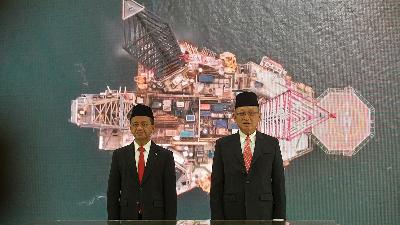
Just months before the end of his term, Jokowi appointed Bahlil Lahadalia as Energy and Mineral Resources Minister. The position is considered prone to conflicts of interest.
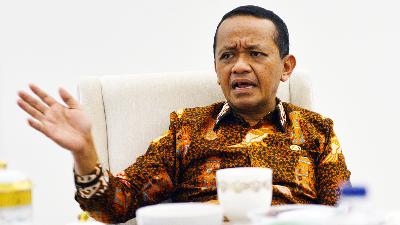
Interview with Minister of Investment Bahlil Lahadalia about mining business permits IUP for mass organizations, and the debate with Luhut Pandjaitan.
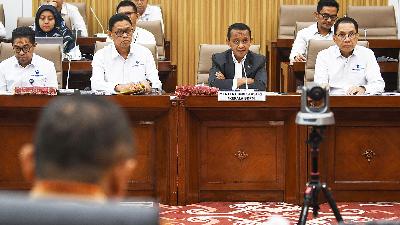
The role of Bahlil Lahadalia in revoking mining business licenses draws attention of the House of Representatives and civil society groups, amidst concerns of possible licensing corruption.

Bahlil Lahadalia explains the uproar over the revocation of mining permits as well as alleged extortion of money and shares in exchange for reinstatement of the permits.

Bahlil Lahadalia has a glimmering political and businees career. He is aiming for Golkar Party’s top position.

Top management of Bank Mayapada allegedly obtained kickbacks from customer credit disbursements. The OJK was lax in their oversight of this bank owned by a member of the Presidential Advisory Council.
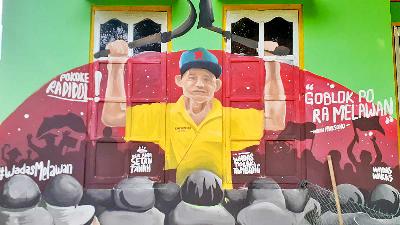
Some villagers in Wadas have been fighting against the plan to mine andesite in the village for years. These protestors and the activists assisting them have been subject to various efforts to intimidate.
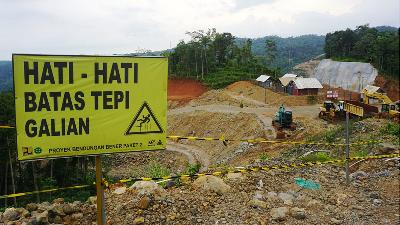
The government is insistent on excavating andesite rock in Wadas village. Opening the mine to build a dam altered the zoning regulations and ignores potential landslides.

Being an ambassador will be a new experience for both Todung Mulya Lubis and Muliaman Darmansyah Hadad.

Slamet Ambari, as Jadag in the film Turah, won Tempo’s Best Actor because of his impressive portrayal of a frustrated character.

LAST Wednesday an Achmad Sadali abstract painting created in 1973 was on display on the mezzanine floor of the Energy Building in Senayan, South Jakarta. Hundreds of people visiting the exhibition were seen immersed in the beauty and detail of the painting. It is not every day that the public gets to enjoy the painting from Arifin Panigoro's collection, by a painter known as the founder of the Bandung school.

When he was still the inspector-general at the Ministry of Finance three months ago, Kiagus Ahmad Badaruddin, 59, was angered by a report on a sum of Rp3 billion that had been deposited into his wife's account. It shook him, particularly since he was being considered for the position of chairman of the Center for Financial Transactions Reporting and Analysis (PPATK).
That report spread to the Presidential Palace and to the finance ministry. Finance Minister Sri Mulyani, who recommended Badaruddin to be PPATK chief, took a deeper look at the report. "She asked me what the money was all about," recounted Badaraddin, or Badar as he is familiarly known.

When he was still the inspector-general at the Ministry of Finance three months ago, Kiagus Ahmad Badaruddin, 59, was angered by a report on a sum of Rp3 billion that had been deposited into his wife's account. It shook him, particularly since he was being considered for the position of chairman of the Center for Financial Transactions Reporting and Analysis (PPATK).
That report spread to the Presidential Palace and to the finance ministry. Finance Minister Sri Mulyani, who recommended Badaruddin to be PPATK chief, took a deeper look at the report. "She asked me what the money was all about," recounted Badaraddin, or Badar as he is familiarly known.

The chairman of the Financial Services Authority (OJK), Muliaman Hadad, 56, is optimistic about the coming year. He believes Indonesia will greet the coming year with growth exceeding the 5.2 percent target set by the government. "We can do it if we harness domestic potential optimally and continue with our reforms and transformation programs to enable investment," said Muliaman.
His views do not reflect those of global economic leaders who met at the annual conference of the World Bank and International Monetary Fund (IMF) in Washington, DC recently, at which Muliaman himself attended. Participants at the meeting proclaimed that the world economy was growing exceedingly slow, taking far too long to recover and benefitted only a handful of people. They concluded that the weakening of the global economy which began in 2014, had yet to recover in the coming year.

Corruption is suspected in the procurement of the TNI's six new sets of radars. The BPK and the KPK must be given access to scrutinize the transaction.

AIDUL Fitriciada Azhari, 48, turned out to be the dark horse in the search for a chairman of the Judicial Commission. He was a last-minute entry after the House of Representatives' (DPR) law commission rejected two of the candidates, and he got the job. "I wasn't even under consideration so it was just pure chance," said Aidul at his Jakarta office last week.
He is now responsible for completing the work to be done by the commission, from reinforcing its legitimacy to ironing out relations with the Supreme Court and addressing the problem of judges' safety. "All this is to protect the integrity of the judiciary," he told Tempo reporters Tulus Wijanarko, Fransisco Rosarians and Raymundus Rikang.

Magnus Ekbom stepped into a meeting room in a building on Jalan Rasuna Said in Kuningan, where the e-commerce company has just moved its offices a few months ago to accomodate his growing team.
At the helm of Lazada since 2012, Ekbom has ushered the online shopping platform to be the biggest in Indonesia. But he is not planning to take a breather just yet. For Ekbom, running an e-commerce company is like running in a marathon. "And we're only in the first couple of kilometers down the line," he said.

According to Prasada Rao, ignorance has been the biggest barrier in dealing with the decades-old HIV/AIDS epidemic. This is why he speaks openly about the disease, freely discussing such topics as sex and sex education, which most Asians see as taboo, so that the social stigma attached to its victims can be erased, a first step in the prevention and treatment of the disease.
Rao truly believes that an open discussion of the subject would be the best protection against the disease, yet the biggest challenge in addressing this global epidemic. "For Asians, sex is taboo. It's in your bedroom, not on the road. So there's always that challenge," he told Tempo.

TWO hours into a pleasant voyage on the waters of the Padaido group of islands to the south of Biak in Papua, the situation became tense. That Saturday morning two weeks ago, photographer Tony Hartawan and I had just passed Pakreki island. The waters around this large unoccupied, rocky island covered in lush tropical forest, seemed to be a final test for us before arriving at our destination: Meosmangguandi island.
The sea, which had earlier been quite calm, suddenly became very rough. Suddenly, our boat, a 'johnson' perahu, as local fishermen call their traditional boats with attached engines, was hit by waves coming from all directions. Tony, who was sitting in the stern, several times glanced to the rear, a fixed smile on his face. I responded with no less a worried expression. "Meosmangguandi!" The shout from Melkias Rumkorem, a traditional Meosmangguandi elder, brought with it a new sense of calm. He pointed towards where the boat was heading, all while it was rising, falling and rolling from side to side over the waves.

Engraved on a 15-meter-high stone pillar are 14 eternal edicts. Carved in the 2nd century BCE, the edicts were made by Piyadasi or Devanampiyadasi, the king who ruled the area that now forms most of India.
Almost all its lines are fascinating, but the most stirring is the seventh edict:

Fighting corruption is nothing new in Indonesia. But the battle fought by people in rural areas may be something that is little known by the general public. According to Zainal Arifin Mochtar, Director of the Center for Anti-Corruption Studies at Gadjah Mada University, efforts by villagers to fight corruption have to be considered significant, because so far, awareness about fighting it is mostly present amongst the middle classes in urban centers.
Urban communities are generally better informed and they are abetted by the many anti-corruption activists in towns. But when anti-corruption figures in the country's remote areas begin to emerge, it is a most important development.

The banking business is in a flux as a result of the war of interest rates among banks. But the owner of the Mayapada Group, Dato Sri Tahir, is optimistic that the banking sector in Indonesia will continue to grow. "Growth depends on situations and conditions," Tahir told Tempo, two weeks ago. Having travelled all over the world, Tahir concluded that the best investment opportunities are still found in Indonesia.
He believes that investment opportunities in Indonesia are still better and that includes the business prospects of his Mayapada Group. He told Tempo reporter Christine Munthe in an interview that he would never sell Mayapada for whatever price. Excerpts:

The face on one of the terracotta piggybanks at the Majapahit Museum in Trowulan, East Java, has chubby cheeks and slanted eyes. The right and left eyebrows are connected, curving dramatically like a wave. The lips seem to smile faintly, expanding the already thick chin.
This is the piggybank Muhammad Yamin saw decades ago and declared the face of Gajah Mada. In reality, poet Sapardi Djoko Damono contends, that face bears more resemblance to Yamin himself. Sapardi thinks the real face of Gajah Mada was not as chubby as the terracotta figure's. Agus Aris Munandar, a University of Indonesia archeologist who has studied Gajah Mada, also differs from Yamin in his interpretation of the face of the man who uttered the legendary Sumpah Palapa (Palapa Pledge), in which Gajah Mada vowed not to eat any spices until he had conquered the whole of the Nusantara archipelago for the Majapahit empire.

Indonesia is Canada's biggest export market in the Association of Southeast Asian Nations (ASEAN). To further strengthen the two countries' economic relations, Canadian Foreign Minister John Baird visited his Indonesian counterpart, Marty Natalegawa, on Tuesday last week.
During a press conference at the Pancasila Building in Jakarta, Baird expressed Canada's interest in cooperating with Indonesia in a number of sectors. "We want the same thing: work opportunities and improvement in people's welfare," he said. According to Marty, one of the sectors the Northern American country wants to focus on is transportation. "Canada's investment is highly positive," Marty said.

The KPK is looking into the connection between Toto Hutagalung and Bandung Mayor Dada Rosada in the bribery case of Judge Setyabudi. Allegedly, Toto often got projects from Dada.

Madakaripura, Gajah Mada's last abode, is not in Probolinggo, as has been long believed, but in Pasuruan.

The population of bidadari (Standardwing) birds, the mascot of North Maluku, is gradually restored. A group of young bird lovers in Halmahera plays a major role.

A mining company filed a lawsuit against Radar Tegal. The media is deemed to have violated procedures in the Press Law.

The management of Soekarno-Hatta Airport is muddled due to aged power and radar systems.

In several villages in Ngada regency, Central Flores, water was once a rarity frequently fought for. Locals finally managed to “penetrate” water springs through three-village cooperation.

Bloggers in Malaysia united to ridicule and criticize Prime Minister Abdullah Badawi, but Pak Lah, as he is familiarly known, withstood the onslaught.

Eight pairs of candidates for gubernatorial posts signed a declaration for peaceful regional heads elections (Pilkada) last Thursday. The ceremony took place before the Baiturrahman Grand Mosque, Banda Aceh.
Independent journalism needs public support. By subscribing to Tempo, you will contribute to our ongoing efforts to produce accurate, in-depth and reliable information. We believe that you and everyone else can make all the right decisions if you receive correct and complete information. For this reason, since its establishment on March 6, 1971, Tempo has been and will always be committed to hard-hitting investigative journalism. For the public and the Republic.